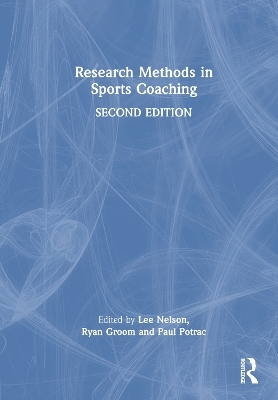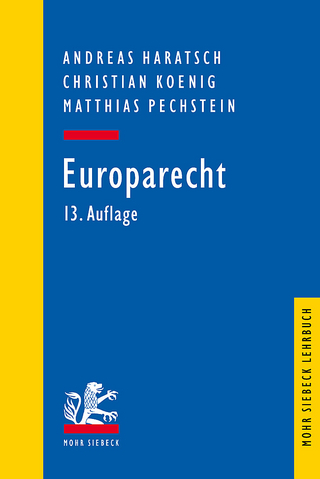
Research Methods in Sports Coaching
Routledge (Verlag)
978-1-032-46482-4 (ISBN)
- Lieferbar (Termin unbekannt)
- Versandkostenfrei innerhalb Deutschlands
- Auch auf Rechnung
- Verfügbarkeit in der Filiale vor Ort prüfen
- Artikel merken
Research Methods in Sports Coaching is a key resource for students and scholars who are completing research into sports coaching. The book comprises five distinct parts that prompt readers to think about important considerations:
preparing and initiating the coaching research process
philosophical considerations for coaching research
coaching research designs
methods of collecting coaching data
analysing coaching data
This fully revised edition places particular emphasis on introducing the diverse research paradigms, research designs, as well as methods of data collection and analysis available to coaching researchers.
Written by a team of leading international scholars and researchers from the UK, Sweden, the United States, Canada, New Zealand, and Australia, this book bridges the gap between the theory and practice of sports coaching research. The second edition of Research Methods in Sports Coaching is an essential text for any research methods course taken as part of a degree programme in sports coaching or coach education.
Lee Nelson is a Reader in sports coaching in the Department of Sport and Physical Activity at Edge Hill University, UK. He leads the department’s Practice in Coaching and Teaching Research Group. His research focuses on developing a critical social analysis of sports work in community and performance coaching as well as professional education contexts. He principally utilises qualitative research methods as well as dramaturgical and interactionist theoretical frameworks to understand how sports workers experience and navigate organisational life. Ryan Groom is a Senior Lecturer in the College of Exercise Sciences at the University of Derby, UK. His work is based at the intersection of interactional sociology and psychology, predominately working within interpretive applied naturalistic and ethnographic frameworks within elite sport. He has published widely in journals examining video-based feedback, organisational change, mentoring, and learning. He has also co-edited Research Methods in Sports Coaching (2014, Routledge) and Learning in Sports Coaching (2016, Routledge). Paul Potrac is a Professor of sports coaching in the Department of Sport, Exercise Rehabilitation at the University of Northumbria at Newcastle, UK. He combines qualitative research methods and dramaturgical and symbolic interactionist theorising to critically examine the interactive, relational, and emotional dimensions of group life in high-performance and community sport contexts. He holds visiting professor positions at University College Dublin and Cardiff Metropolitan University.
Introduction. Part I: Preparing and initiating the coaching research process. 1. Navigating the research process. 2. Reviewing the literature and formulating topics. 3. Ethical considerations. 4. Judging the quality of coaching research. Part II: Philosophical considerations for coaching research. 5. Philosophy of knowledge. 6. Logical positivism: Quantitative measurement in the study of coaching behaviours, their effects on athletes, and their modification. 7. Interpretivism: Exploring meaning making, intentional action, and group life in coaching research. 8. Critical theory: Social justice approaches to coaching research and practice. 9. Critical realism: Explaining causal mechanisms that underpin events, entities, and (inter)actions in coaching. 10. Poststructuralism: Poststructuralist approaches to sports coaching research. Part III: Coaching research designs. 11. Experimental designs. 12. Case studies. 13. Ethnography. 14. Autoethnography. 15. Phenomenology. 16. Mixed methods research. 17. Action research. Part IV: Methods of collecting coaching data. 18. Systematic observation. 19. Participant observation. 20. Surveys and questionnaires. 21. Individual and focus group interviews. 22. Using documents. Part V: Analysing coaching data. 23. Analysis of quantitative data. 24. Doing qualitative data analysis.
| Erscheinungsdatum | 10.12.2024 |
|---|---|
| Zusatzinfo | 7 Tables, black and white; 10 Line drawings, black and white; 10 Illustrations, black and white |
| Verlagsort | London |
| Sprache | englisch |
| Maße | 174 x 246 mm |
| Gewicht | 453 g |
| Themenwelt | Sachbuch/Ratgeber ► Sport |
| Sozialwissenschaften ► Pädagogik ► Erwachsenenbildung | |
| Weitere Fachgebiete ► Sportwissenschaft | |
| ISBN-10 | 1-032-46482-8 / 1032464828 |
| ISBN-13 | 978-1-032-46482-4 / 9781032464824 |
| Zustand | Neuware |
| Informationen gemäß Produktsicherheitsverordnung (GPSR) | |
| Haben Sie eine Frage zum Produkt? |
aus dem Bereich


